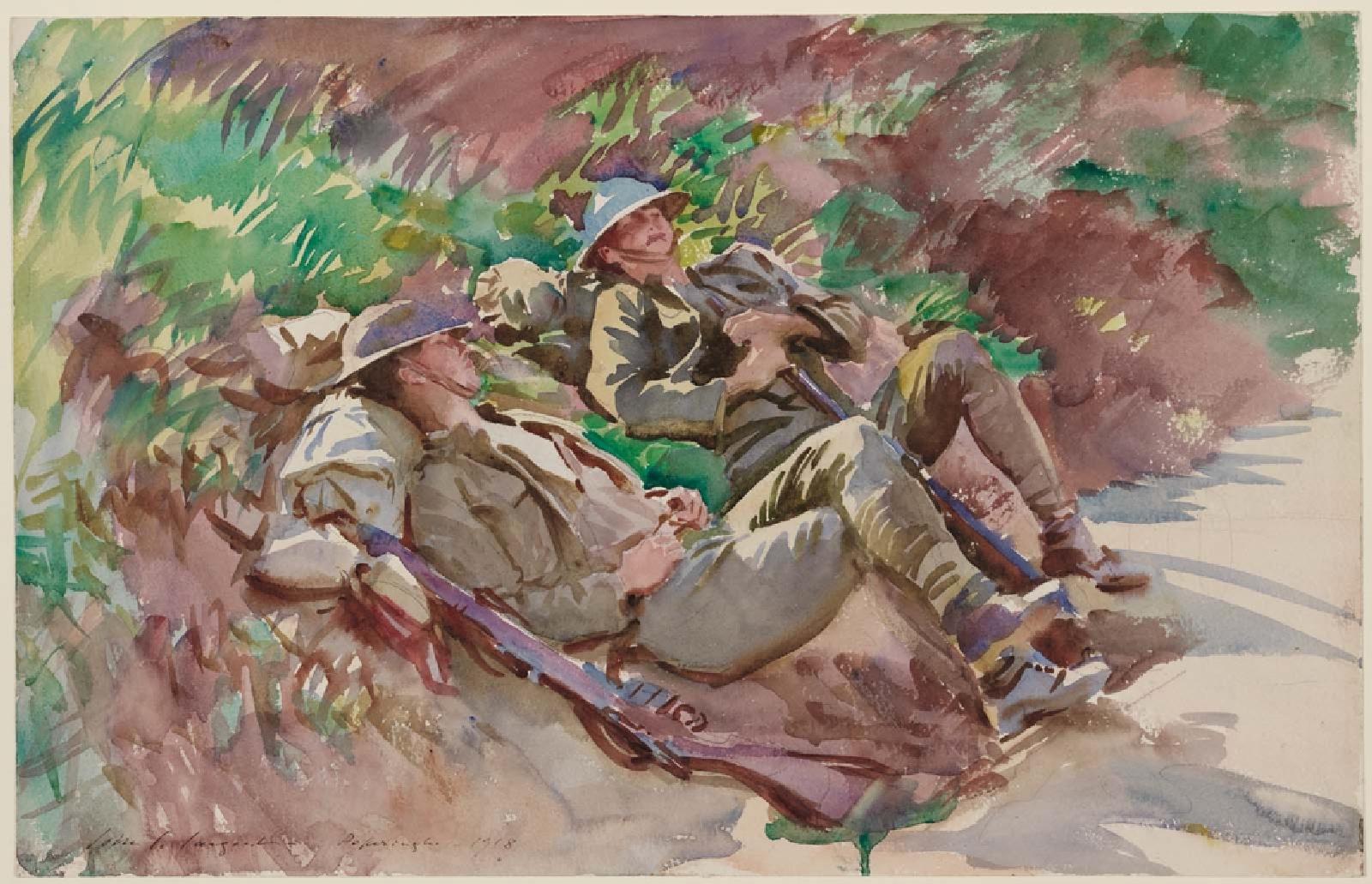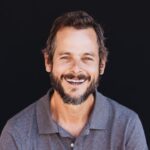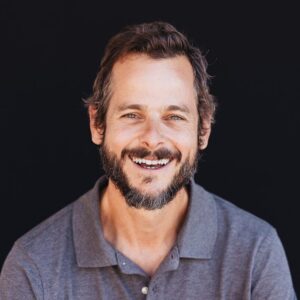…I am convinced that Western civilization, especially what passes for civilization and culture here and now in our own United States, is trying to solve ever-multiplying, ever more crucial problems with the same simplistic thoughts, the same materialism indeed, that are themselves the original cause of these problems. I believe that not only some, but most, of the major difficulties our present civilization will be encountering from now on will prove unsolvable by approaches that take so little account of the spiritual.
John Fentress Gardner
Eating lunch at a nearby restaurant not long ago I overheard two people discussing the current administration. I recognized the man, a past colleague at the local university. “They’re lazy and evil,” he said. She—an old student of his visiting from Wisconsin, I learned—very much agreed. They both spoke in a tone I catch in myself: the ill ecstasy of self-righteousness. “I’m glad I’m heading home soon,” the visiting alum said. “Madison’s 90% Democrat.”
Listening to talk radio on the way home from work a few days later, I heard the host say this of certain movers and shakers of the right wing: “These people look like the cartoon demons that they are.” Her tone was elation—elation over her own ethical acumen.
Then the day after Easter a friend forwarded me this message that our president posted on his social media account:
Happy Easter to all, including the Radical Left Lunatics who are fighting and scheming so hard to bring Murderers, Drug Lords, Dangerous Prisoners, the Mentally Insane, and well known MS-13 Gang Members and Wife Beaters, back into our Country. Happy Easter also to the WEAK and INEFFECTIVE Judges and Law Enforcement Officials who are allowing this sinister attack on our Nation to continue, an attack so violent that it will never be forgotten! Sleepy Joe Biden purposefully allowed Millions of CRIMINALS to enter our Country, totally unvetted and unchecked, through an Open Borders Policy that will go down in history as the single most calamitous act ever perpetrated upon America. He was, by far, our WORST and most Incompetent President, a man who had absolutely no idea what he was doing — But to him, and to the person that ran and manipulated the Auto Pen (perhaps our REAL President!), and to all of the people who CHEATED in the 2020 Presidential Election in order to get this highly destructive Moron Elected, I wish you, with great love, sincerity, and affection, a very Happy Easter!!!
This political commentary—standard fare, I’d say—affords us a glimpse of how we are these days. We are unwell. And it seems our country has two choices: proceed apace with this politics of reduction, stoking more antagonism, possibly of the tectonically violent sort, or openly and immediately—for the sake of the people, places, and non-human creatures of this country; for the sake of our children whose fates we daily shape; and for the sake of the rest of the world, which our country so hauntingly affects—work toward seeing each other clearly again.
What is the nature of such seeing?
One answer to that question begins with a line of poetry from W.S. Merwin (a deceptively simple line, a line that risks invisibility in this time of centrifugal speed and shrill complexity, in this time of the Internet): “we are all here together without knowing it.”
Yes, that sounds about right.
By who knows what grace, we are here, alive and together—but we seem to have lost contact with that mysterious, humbling, thawing fact.
But we’ve all had moments of contact. Maybe you see frizzy purple yarn tied to the zipper of a child’s backpack. Or a dog walks into a café. Or maybe you’ve been sick, close to dying, and while being driven to another appointment, you look out the window to a low gray sky, the familiar pine trees, gas stations, and parking lots, and to a man—you’ve seen him there for years—fishing beneath the bridge along the chalky-blue river—nothing strange…suddenly so overwhelmingly strange. And all at once you are acutely, hurtlingly, open-heartedly alive.
Or maybe you taste such thawing knowledge in the Calle Real Center in Goleta, California on a Tuesday afternoon:
ADOLESCENT
In the Calle Real Center parking lot
(Western Dental, Allstate, KFC)
a girl of fifteen sits on the curb
eating a turkey sandwich
engrossed by a video on her phone.
Short hair dyed black, black makeup
around her eyes, a little spiked barbell
above one of those eyes, black jeans,
and camo shirt with a band's name on it:
The Gnarlyboys. It sounds like she’s watching
a standup comic. There’s duct tape on her left
black boot, a sticker of French fries on her phone.
Now she’s texting, her face running
through expressions like a child in dream.
Now back to her video with sound on loud.
No headphones. I’m close to telling her
the volume’s impolite, turn it down,
when she efforts herself up and walks off,
a limp collapsing every other stride,
the limp she’s walked each day for years now
with tormented long-habituated dignity.
I watch her lurch down Calle Real,
past an armored truck, then a laundromat,
then a noodle joint, Weight Watchers,
Verizon Wireless. Once and for all.
Once and for all. May I put down
this knife in my heart
once and for all.
“Seeing each other clearly again” doesn’t mean waving away the crooked portion of our humanity, the cruel, the disturbing. It doesn’t mean supine acquiescence in the face of a mountingly sick status quo. It doesn’t mean foregoing taking a stand, taking public action, or speaking truth to power. Rather, it means seeing beyond our concepts of each other, our labels, the incessant cognitive shorthand. All wisdom is rooted in the rectification of proper names, Confucius famously proposed. We need—challenging as it is—to grapple with the rectification of better names. Democrat, Republican; black, white; gay, straight; citizen, immigrant; Palestinian, Israeli; Russian, Ukrainian; masses, elites. These names aren’t always proper. These names aren’t always enough. These names shroud complexity, disavow fullness. These names are often enemies of the sacred. If used without awareness of their limits, these names aid and abet the crisis of meaning and the surreally normalized violence of heart (and online trolling) that is general now. “Among the most sinister of phenomena in intellectual history,” wrote Elias Canetti, “is the avoidance of the concrete.” Our widespread shorthand is not adequately concrete.
What might proper naming sound like?
Who are these characters? They defy neat summary. They elude facile capture.
Literature—with its rich particularizations, with its resistance to simple conclusions, pat definitions, and ideology—gives us examples. Homer’s Odysseus. Chekhov’s Ivan Velikopolsky. Ralph Ellison’s Invisible Man. Walt Whitman’s I. Willa Cather’s Father Jean Latour. F. Scott Fitzgerald’s Jay Gatsby. Who are these characters? They defy neat summary. They elude facile capture. They expose the insufficiency of “warrior,” “student,” “black man,” “gay man,” “colonialist,” “elite.”
David Steindl-Rast, who is 98 years old, recently wrote the following, one of the most wonderful things I have ever encountered: “All creatures are rooted in mystery and therefore deserve our reverence.”
Such is the seeing, I think, that we need right now.
It is striking how few today call for such seeing, for a sacramental eye, for the compassion so trenchant and meticulous it attempts— a ridiculous, terrible, indispensable challenge—to exile no one. It is striking how few today call for what Reverend Martin Luther King Jr. dubbed “God’s love operating in the human heart” in this time when, according to the recent “Stress in America” poll conducted by the American Psychological Association, half of American adults (50%) said tension around social and political topics makes them less likely to “connect with people in general” and, according to a paper published in January of 2019 (“Lethal Mass Partisanship”), “15 percent of Republicans and 20 percent of Democrats agreed that the country would be better off if large numbers of opposing partisans in the public today ‘just died.’”
What accounts for the absence of the call for heart? Why does it seem that so few among us seek the highest point from which to view our time?
Are we so deeply hurt that we don’t know how to move beyond that hurt? Are we afraid of being perceived as touchy-feely or weak? Are we afraid of accusations of bothsidesism, of fence-sitting? (You can’t be neutral on a moving train!) Are we afraid of straying from the safety of identity, the security of the tribe? Has our partisanship become a society-sponsored bigotry? Has war become the force that gives our lives meaning? Are we letting these screens abscond with the human imperative?
“If I can say anything to you,” Thich Nhat Hanh memorably declares in Peace Begins Here, a book written to foster peace between the Israelis and the Palestinians, “it is to invite you to look deeply and recognize the real enemy. That enemy is not a person. That enemy is a way of thinking that has brought a lot of suffering for everyone.”
The next great political movement in our country will be the movement that understands Thich Nhat Hanh’s insight. And understands the insight sincerely—not because it was polled, focus-grouped, and approved by the power brokers and political consultants in charge of “perception management.” We need a politics that knows that the greatest truth is not political. We need a politics that understands that the problems of our time exist not because of one political party or politician. The problem of our time is that we think that the problems of our time exist because of one political party or politician. “I have no enemies,” I heard someone say recently, “except those who keep telling me which ones I must have.”
Ah, this is naïve emotional bosh, I hear you respond. Foolishly impractical. Insultingly out-of-touch. If I wanted to hold hands and sing kumbaya, I would’ve gone back to summer camp.
But what other option is there?
Would it be wiser to stay the course and see where this gathering hatred leads? Furthermore, we are constrained to try for magnanimity (not avoidance, not acquiescence, but magnanimity) by the mere fact of the children. “We must choose between the violence of adults,” writer and Holocaust survivor Elie Wiesel famously said, “and the smiles of children, between the ugliness of hate and the will to oppose it.”
Two stories come to mind, the first well-known, the second not.
On Christmas Eve of 1914 on the hellish Western Front of the First World War something remarkable occurred. An English soldier reported how Germans began singing carols. The English followed suit. Jibes were then lobbed back and forth, some good-natured, some snide. Soon the Germans hoisted Christmas trees (complete with decorations and candles) on the parapets of their trenches. Eventually, one German yelled, “Tomorrow you no shoot, we no shoot!”
The following day, Christmas morning, soldiers of opposing armies—holding white flags or their hands up—entered the “no man’s land” between the barbed wire between the lines. They, for the first time, saw each other’s faces. They shook hands. They gave each other cigarettes, beer, champagne. Exchanged buttons from their coats. One German gave an English soldier a haircut. They ate ham and dark bread. Biscuits, plum puddings, chocolate. They played soccer with improvised balls. And they properly buried the dead, praying together, communally, over the bodies. Afterwards, some traded addresses, promising to visit when the slaughter ended.
Many such impromptu ceasefires occurred that day along the Western Front. It is estimated that almost 100,000 troops laid down their rifles (often in the teeth of orders from their superiors) to come together in spontaneous comradeship.
I heard the second story from my oldest daughter. Earlier this year her high school English class visited a local community center to listen to a Holocaust survivor named George. (The class was reading Elie Wiesel’s Night.) George told of his family’s return to their apartment after the war. At this point George’s family consisted of him, his mother, and his sisters, one of whom had Down Syndrome. His father had been killed. And George said that because of his family’s financial straits, they ended up having to share their old two-bedroom apartment with three ex-Nazi men. In my daughter’s retelling of George’s story, they were in “tight quarters,” sharing a bathroom and kitchen. After weeks of this arrangement, George—who was a young boy then—took his mother aside and yelled, “Why are they here? They tried to kill us!” And George’s mother replied (said my fifteen-year-old daughter over dinner recently): “Don’t let hate take over your heart. That’s what started the war.”
Let’s assume for a moment that if those soldiers on the Western Front—battered as they were in the trenches of a grisly war—could extend grace to each other, even if briefly, we can, too. Let’s assume that if George’s mother could share her roof, her bathroom, and her kitchen with members of a group that killed her husband and once sought to kill her and her children, then we Americans can try to extend hospitality to each other, too.
And let’s assume that if Thich Nhat Hanh could live through two wars (“I know what war is—you don’t know whether you will be alive this afternoon”), narrowly surviving an assassination attempt and losing many loved ones to the violence, then live through a forced exile, and still find it in his heart to not only forgive and love his enemies but spend decades helping others do the same, we can at least attempt forgiveness and love, too.
What is being asked of us? Which way forward? What is the outlook this moment demands?
We are all here together without knowing it, said W.S. Merwin.
May we know it again. We are here. May we see that we are all rooted in this mystery and therefore (via a logic beyond understanding) deserving of reverence. May we consider Thich Nhat Hanh who proposed that our enemy is not our enemy. And may we remember Thomas Jefferson who in his inaugural address said that though we call each other “different names” we are (and this marvelous phrase is not merely political!) “brethren of the same principle.”
And let us recall poet William Stafford who shared this bit of caution:
If you don’t know the kind of person I am
and I don’t know the kind of person you are
a pattern that others made may prevail in the world
and following the wrong god home we may miss our star.
For there is many a small betrayal in the mind…
Painting by John Singer Sargent via Wikimedia





2 comments
Teddy Macker
Thank you, Stephen. I appreciate your words.
Stephen
A terrific sentiment and beautifully written. And the poem will stay with me for some time.
Comments are closed.